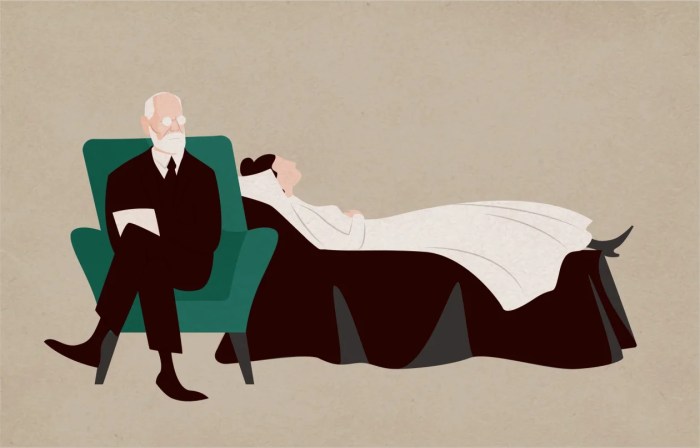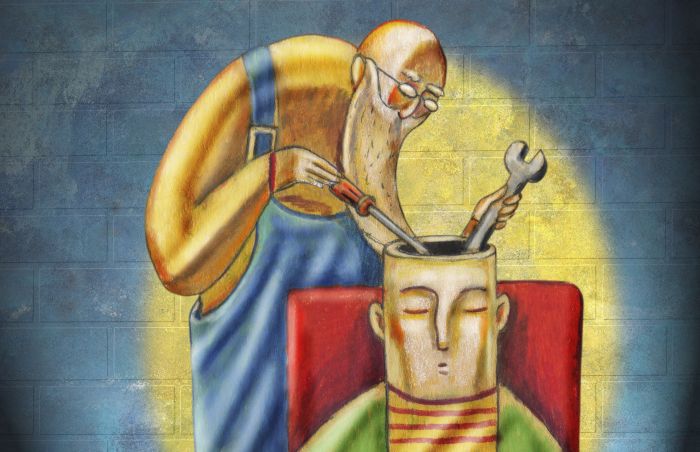Which major force in psychology emphasized unconscious sexual conflicts – Psychoanalysis, a major force in psychology, emphasized the role of unconscious sexual conflicts in shaping human behavior. This perspective, pioneered by Sigmund Freud and Carl Jung, revolutionized our understanding of the human psyche and its impact on our actions, thoughts, and emotions.
The central concept of psychoanalysis is the unconscious mind, a realm of thoughts, feelings, and memories that are inaccessible to conscious awareness. According to Freud, the unconscious mind contains repressed sexual and aggressive impulses that drive our behavior and shape our personality.
Origins of the Emphasis on Unconscious Sexual Conflicts: Which Major Force In Psychology Emphasized Unconscious Sexual Conflicts

The emphasis on unconscious sexual conflicts in psychology emerged in the late 19th and early 20th centuries. It was largely driven by the work of Sigmund Freud and Carl Jung, who believed that unresolved sexual conflicts from childhood could lead to psychological problems in adulthood.
Key Figures
- Sigmund Freud: Developed the theory of psychoanalysis, which emphasized the role of unconscious conflicts, particularly those related to sexuality, in personality development and mental disorders.
- Carl Jung: Developed the theory of analytical psychology, which also recognized the importance of unconscious conflicts but placed more emphasis on collective unconscious and archetypes.
Key Concepts and Theories

The unconscious mind, according to Freud, is a reservoir of thoughts, feelings, and memories that are not accessible to conscious awareness. These unconscious conflicts can manifest in various forms, including dreams, slips of the tongue, and neurotic symptoms.
Unconscious Mind and Sexual Conflicts, Which major force in psychology emphasized unconscious sexual conflicts
- The unconscious mind contains repressed thoughts, feelings, and memories that are too threatening or painful to be consciously acknowledged.
- Sexual conflicts are a major source of unconscious conflicts, stemming from unresolved issues during childhood development.
Theory of Infantile Sexuality
- Freud proposed that children go through a series of psychosexual stages, each characterized by a different erogenous zone.
- Unresolved conflicts during these stages can lead to fixations, which can influence adult personality and behavior.
Oedipus and Electra Complexes
- The Oedipus complex describes the unconscious sexual desire of a boy for his mother and hostility towards his father.
- The Electra complex is the female counterpart of the Oedipus complex, involving a girl’s desire for her father and hostility towards her mother.
Methods and Techniques

Psychoanalytic techniques aim to uncover unconscious conflicts and bring them to conscious awareness. These techniques include:
Psychoanalytic Techniques
- Free association: Encouraging patients to say whatever comes to mind, without censorship, to reveal unconscious thoughts and feelings.
- Dream analysis: Interpreting the content of dreams to access unconscious material.
- Transference: The patient’s unconscious feelings and attitudes towards the therapist, which can provide insights into past relationships and conflicts.
Strengths and Limitations
- Strengths: Can provide deep insights into unconscious processes and their impact on behavior.
- Limitations: Time-consuming, expensive, and may not be suitable for all patients.
FAQ Compilation
What is the unconscious mind?
The unconscious mind is a realm of thoughts, feelings, and memories that are inaccessible to conscious awareness. It is believed to contain repressed sexual and aggressive impulses that drive our behavior and shape our personality.
How did Sigmund Freud contribute to the emphasis on unconscious sexual conflicts?
Sigmund Freud was the founder of psychoanalysis and the primary proponent of the emphasis on unconscious sexual conflicts. He believed that the unconscious mind is the key to understanding human behavior and that repressed sexual desires are the root of many mental disorders.
What are the criticisms of psychoanalysis?
Psychoanalysis has been criticized for its lack of scientific rigor and its focus on sexual conflicts. Some critics argue that psychoanalysis is not a valid scientific theory and that its emphasis on sexual conflicts is outdated and overly simplistic.

